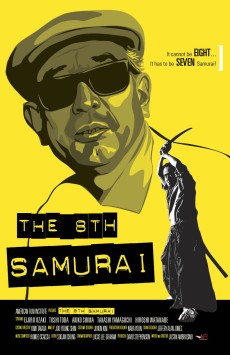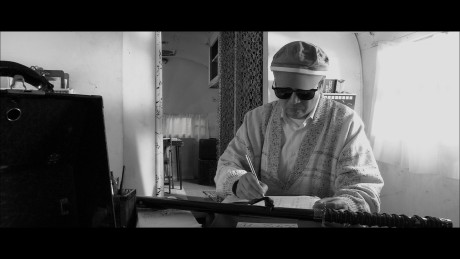 Remember The 8th Samurai, a short film about an actor who is fired from the set of a samurai film directed by a man who bears an uncanny resemblance to Kurosawa?
Remember The 8th Samurai, a short film about an actor who is fired from the set of a samurai film directed by a man who bears an uncanny resemblance to Kurosawa?
Director-writer Justin Ambrosino was kind enough to send me a copy of his work, and I have now watched it a couple of times and finally found the time to put down a few words. What follows are some observations that I thought people frequenting this site might find interesting. Yet, let me say that this is not really a structured review, mainly because I don’t quite know how to review a short film which, at the end of the day, is perhaps intended more as a display of skills than as a fully realised artistic statement.
Since the main question that you want an answer to is probably “is it worth watching?”, I’ll tackle that one first. While the film won’t blow your mind and doesn’t really offer any new perspective on Kurosawa or his works, I nevertheless quite enjoyed it, and would recommend it. I wouldn’t go out of my way to get to see it, but if it’s playing in a theatre, TV channel or DVD player near you, it’s certainly worth the half an hour, plus the additional time discussing it on this website. Hopefully, the DVD, or better yet a paid download of the film, will be made available on the official website sometime soon.
The cast is for the most part really good, and there are what seem to be a couple of fun references to characters from Kurosawa’s films thrown in there. However, and perhaps quite predictably, one notable performance bothered me — I had trouble believing the “Kurosawa” character. Although the director is never identified by name in the movie, I automatically took Kurosawa as my reference point. And why wouldn’t you:

Unfortunately, the character in the film seems the wrong height and has wrong mannerisms, at least based on what I have seen of Kurosawa. He also appeared quite whimsical, playing with the “mad genius” character type that Kurosawa has for some reason time to time been identified with (and which I think was quite far from his actual character). On the other hand, perhaps having someone actually imitate Kurosawa wouldn’t really have been any less strange, either.
Another aspect that I found curious in relation to the director was the time frame of the film. Presumably set during the Seven Samurai shoot in 1950s, a notion that is enhanced by some of the equipment shown, the “Kurosawa” in the film had the director’s distinct 1980s look, although the actor playing him was considerably younger. This is certainly something that most viewers wouldn’t think about, but if you have spent as much time with Kurosawa as we have, things like these may confuse you and consequently make the viewing experience, if not worse, at least somewhat stranger.
Having said all that, the Kurosawa character is actually not very central to the film. What is more interesting is the main character (the titular eighth samurai) and his relationship with his dead mother, who is excellently portrayed by actress Akiko Shima — probably my favourite performance of the short film. Although the relationship doesn’t quite resolve itself, it works well in the story.
Apart from the interaction between these two characters, the overall story does not come across all that important, and as a result the film does end up a little like a series of interesting scenes more than a unified film driven by its story. This is not necessarily a bad thing, however, as some of the scenes are really well constructed. And as I mentioned earlier, one does get the feeling that you are watching a display of skills intended for those making and financing films, rather than a story made for us, the casual audience.
I am not one who can properly evaluate the technicalities of film making, but I do know when I like something that I see and when I don’t (and I guess that’s the ultimate goal of any film maker (to please us, the audience, that is)). For the most part, what I saw in The 8th Samurai I liked. There were a few more awkward cuts and shots, and if I had to pick one aspect of the film that most bothered me technically, it would be the lighting that I felt was too stage-like even for a black and white film. The subtitle translation (the film speaks Japanese) also seemed off the mark a few times, which felt strange considering that it is an American production.
Having so far mainly talked about what I saw, it would be a crime to finish this piece without talking about what I heard. The score, and especially so the theme piece, all by Romeo Scaccia, is perhaps the most memorable part of the film. Just like with the theme of Seven Samurai, which the theme of The 8th Samurai in many ways resembles while still retaining its own identity, you will find yourself humming this one long after the film has ended.
In conclusion, The 8th Samurai is an interesting little film that is worth viewing if given the chance, if only to ponder over the depiction of the Kurosawa character, and how it fits in with the historical Kurosawa and the mythical Kurosawa, both of which I feel are represented in film studies. With strong acting, a beautiful score and a number of interesting scenes to its merit, I would say that Justin Ambrosino has shown promise with his short film. I will certainly be keeping an eye on whatever it is that he will be working on next.






Nice review, it does now create a high curiosity of the film.
I would imagine Ambrosino intended this more a tech reel but still a paid download option would be great, as otherwise I doubt anyone outside of festival is going to ever get to see this short. And he’s got at least one person willing to pay for it.
Having only seen the trailer, you comments about “Kurosawa” reflect my initial impressions. The one thing that stuck out, was “Kurosawa” seem far too light, and high tilted, oppose to the heavier and lowered real-life Kurosawa-if that make any sense, as I mean more metaphoric then physical. Of course this assumes my impression of Kurosawa are accurate, those being a man with that carries some heavy burdens and has his share of hard-knocks but certainly no magical genius or so high sprung as the short’s “Kurosawa” betrayed. Although as mentioned, I do wonder if a more “accurate” Kurosawa would reduce any oddity in his portrayal.
If the film doesn’t really focus on this “Kurosawa” I suppose such things don’t hold much weight in the end.